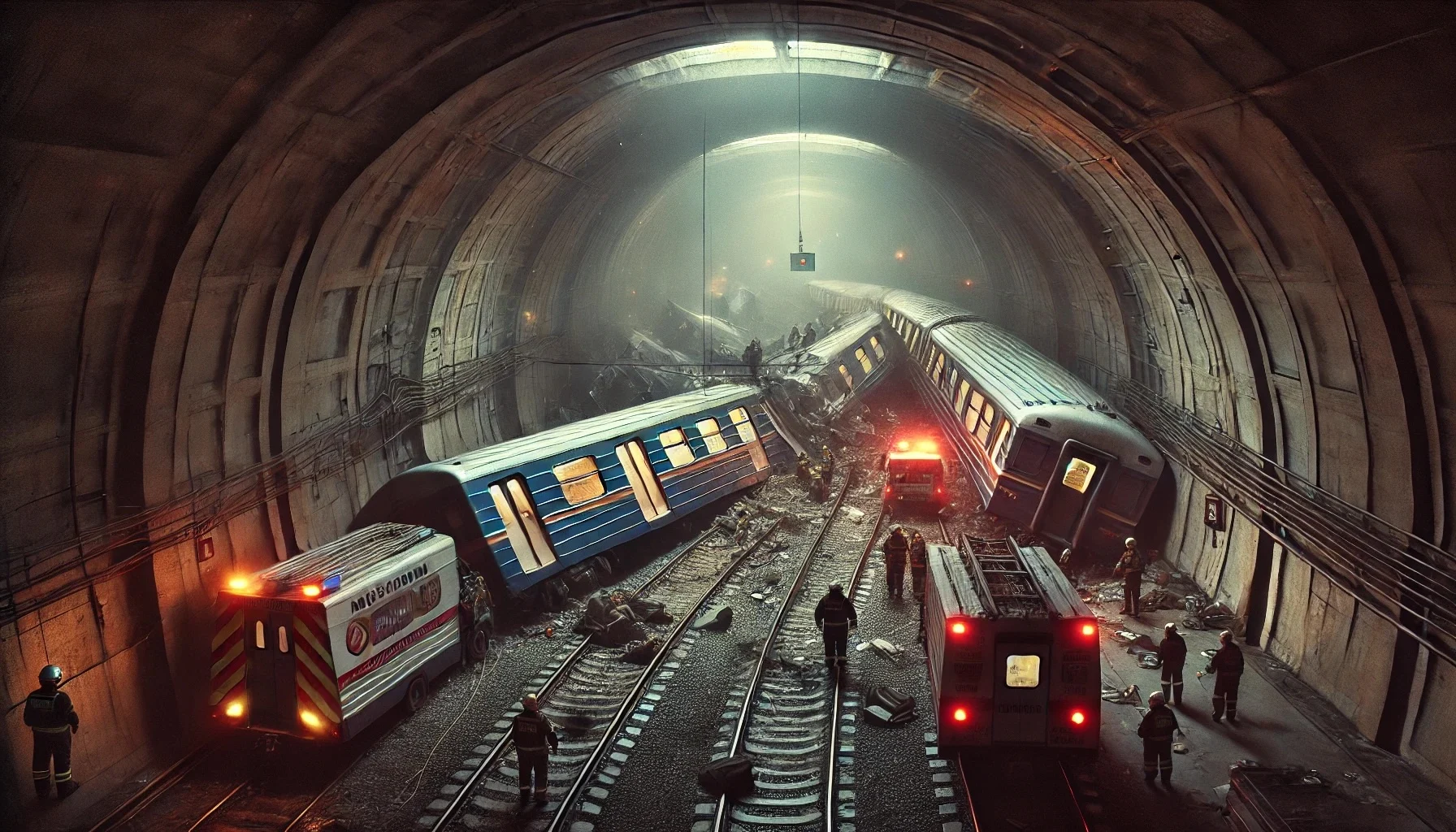
The 2014 Moscow Metro Derailment
by: The Calamity Calendar Team
July 15, 2014
The Morning Commute Turns to Chaos
On the bustling morning of July 15, 2014, commuters in Moscow boarded the Metro with the expectation of a routine journey. The Moscow Metro, one of the busiest subway systems globally, had a reputation for its punctuality and safety. However, on this fateful day, those expectations were shattered.
At precisely 08:39 AM, a train traveling between the Slavyansky Bulvar and Park Pobedy stations suddenly derailed. Park Pobedy station, known for its depth, would soon become the site of an unprecedented disaster.
Immediate Aftermath: A City in Shock
The derailment occurred deep within a tunnel, causing three carriages to violently crash and overturn. The immediate aftermath was chaotic and terrifying. Passengers, many of whom were on their way to work, were thrown into a state of panic as they found themselves trapped within the mangled wreckage.
Emergency services were dispatched almost instantly. Over 60 ambulances, alongside rescue workers and fire brigades, converged on the scene, racing against time to reach the victims. The task was daunting, with many passengers trapped in the twisted metal of the carriages, making extrication a slow and meticulous process.
Thanks for subscribing!
By 09:30 AM, first responders had begun the grueling task of evacuating and rescuing those caught in the wreck. The tunnel’s depth and the extent of the damage complicated their efforts, but the resolve of the rescuers never wavered.
Unfolding Tragedy
As the day wore on, the scale of the tragedy became apparent. By 10:00 AM, reports confirmed the worst fears: multiple fatalities and scores of injuries. The final toll would stand at 24 dead and over 150 injured, a grim reminder of the incident’s severity.
The economic impact was immediate and significant. The derailment not only disrupted metro services, affecting thousands of daily commuters, but also resulted in substantial emergency response costs and repair expenses for the damaged infrastructure. The exact financial cost of the damage remained undisclosed, but the repercussions were felt across the city.
Investigation and Accountability
In the aftermath, an exhaustive investigation was launched to uncover the root cause of the derailment. Early theories suggested a mechanical failure, but it soon became evident that human error played a critical role. The investigation revealed that a track switch, improperly installed and secured during recent maintenance work, was the direct cause of the disaster. This negligence led to the derailment, highlighting severe lapses in the metro’s maintenance protocols.
The findings prompted legal actions against those deemed responsible for the oversight. The repercussions were not just legal but also led to a comprehensive overhaul of the Moscow Metro’s safety procedures.
Lessons Learned and Moving Forward
The 2014 Moscow Metro derailment served as a wake-up call for the city’s transit authorities. In response, they implemented stricter safety protocols and more rigorous inspection routines to prevent such tragedies in the future. The incident underscored the vital importance of meticulous maintenance and the need for a proactive approach to safety in public transportation systems.
Public communication during this period was crucial. Authorities provided regular updates to keep the public informed about the rescue operations and the ongoing investigation, ensuring transparency in the wake of the disaster.
Legacy of the Disaster
The Moscow Metro derailment of July 15, 2014, is etched in the collective memory of the city. It was a day that highlighted the vulnerabilities inherent in even the most reliable systems and the devastating impact of human error. However, it also showcased the resilience and heroism of the emergency responders who worked tirelessly to save lives.
As Moscow continues to grow and evolve, the lessons learned from this tragedy continue to inform safety practices and maintenance routines, striving to ensure that such a calamity never occurs again. The memory of those lost serves as a solemn reminder of the importance of vigilance, responsibility, and the relentless pursuit of safety in public transportation.
In the end, the 2014 Moscow Metro derailment stands as both a tragic chapter in the city’s history and a pivotal moment of transformation, driving home the need for constant vigilance and improvement in urban transit systems.
Stay in the Loop!
Become a Calamity Insider and get exclusive Calamity Calendar updates delivered straight to your inbox.
Thanks! You're now subscribed.